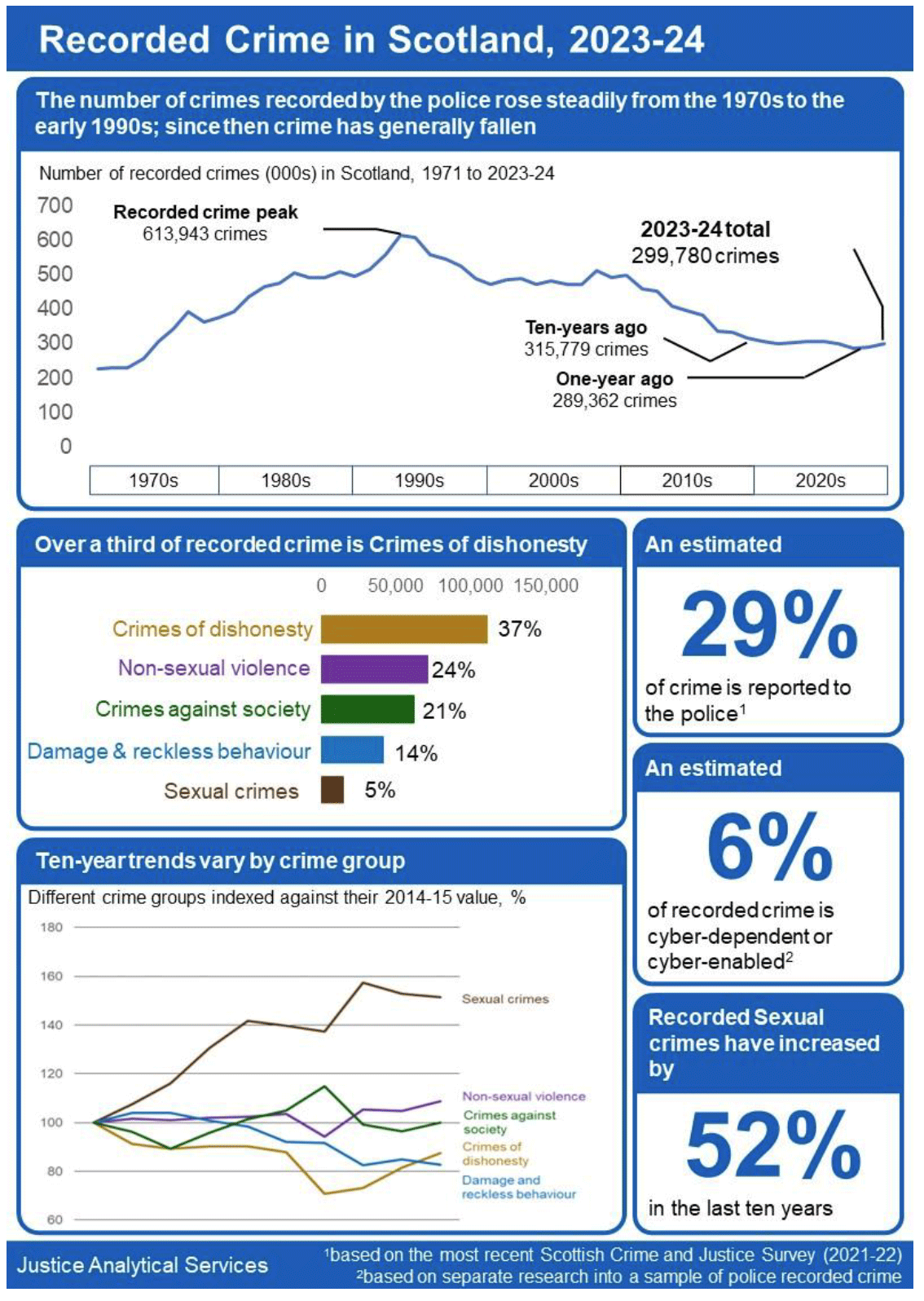Recorded Crime in Scotland, 2023-24
Statistics on crimes and offences recorded and cleared up by the police in Scotland in 2023-24, split by crime or offence group and by local authority.
Key points
Between 2022-23 and 2023-24:
- Crimes recorded by the police in Scotland increased by 4%, from 289,362 to 299,780. The recording of crime remains below the position immediately prior to the pandemic (2019-20) and down 51% from its peak in 1991.
- Non-sexual crimes of violence increased by 4%, from 68,870 to 71,463. Common assault (up 3%) makes up the clear majority (83%) of all non-sexual crimes of violence recorded in 2023-24.
- Sexual crimes decreased by 1%, from 14,602 to 14,484. These crimes are now at the third highest level seen since 1971, the first year for which comparable groups are available.
- Crimes of dishonesty increased by 7%, from 103,393 to 111,054. The recording of these crimes is back to the level seen immediately prior to the pandemic (in 2019-20) and down 74% from the peak in 1991.
- Damage and reckless behaviour crimes decreased by 5%, from 43,123 to 41,129. The recording of these crimes is now at the lowest level seen since 1976.
- Crimes against society increased by 4% from 59,374 to 61,650. Most of these crimes relate to crimes against public justice (41%) or drug possession (34%).
- Offences recorded by the police in Scotland collectively increased by 1%, from 172,207 to 174,073. This included increases in Miscellaneous offences (up 8%) and Road traffic offences (up 3%), whilst antisocial offences decreased by 5%.
Police recorded cyber-crime in Scotland
This bulletin also provides an updated estimate of how many cyber-crimes were recorded in Scotland.
Key Points:
- In 2023-24, an estimated 16,890 cyber-crimes were recorded by the police in Scotland. This was an increase of 2,000 crimes (or 13%) when compared to the estimated volume for 2022-23 (14,890). Levels also remain significantly above the pre-pandemic year of 2019-20 (with 7,710 cyber-crimes).
- Cyber-crimes accounted for an estimated 30% of Sexual crimes in 2023-24, 9% of Crimes of dishonesty and 4% of Non-sexual crimes of violence.
Official Statistics on Clear up rates
In addition to the Accredited Official Statistics on police recorded crimes and offences, this bulletin also presents Official Statistics on crimes and offences cleared up by the police in 2023-24. A definition of clear up rates is provided in the clear up rates chapter.
In 2023-24 the clear up rate was 54.1%, up from 53.3% in 2022-23. Crimes against society (91.4%), Non-sexual crimes of violence (68.0%) and Sexual crime (57.2%) continued to have higher clear up rates in 2023-24 than Crimes of dishonesty (33.1%) and Damage and reckless behaviour (29.6%).

Contact
Email: Justice_Analysts@gov.scot
There is a problem
Thanks for your feedback